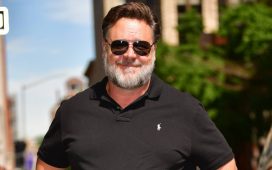When Todd Haynes was promoting his glam-rock fantasy Velvet Goldmine in 1998, he knew exactly what he wanted. “We have a very modest goal for this film,” he said at the time. “That’s just to turn every gay person straight and every straight person gay.” Sitting opposite the 59-year-old director in a London hotel room, I point out that his mission is accomplished. Aren’t we all queer now?
“Not quite,” he says in his US west coast croak. “I wish! It’s true there might be more traffic in that direction. There’s certainly more tolerance.” His films have surely played their part, among them I’m Not There with Cate Blanchett as one of six physically dissimilar Bob Dylans, the melodrama Far from Heaven and the lesbian love story Carol (Blanchett again, this time falling for Rooney Mara). In particular, Velvet Goldmine, which begins with the infant Oscar Wilde arriving in Dublin by flying saucer, looks now like a manifesto for queerness, though it took years to find its audience.

Will the same fate befall his new film Dark Waters? This disturbing real-life conspiracy thriller follows the corporate defence lawyer Rob Bilott, played by Mark Ruffalo, as he switches sides to expose the misconduct of the industrial giant, DuPont. For decades, the company had been dumping the unregulated chemical PFOA – which caused birth defects and cancer – in Parkersburg, West Virginia; it poisoned the land and livestock and thousands of people.
The headline of the 2016 New York Times article on which the film is based says it all: “The lawyer who became DuPont’s worst nightmare.” Bilott is stonewalled, misled and threatened by DuPont but persists doggedly in his fight for justice over more than two decades. No wonder Ruffalo looks exhausted on screen. Hunched, jowly and unsmiling, he resembles a tortoise overburdened by its shell. Watching Dark Waters, you know how he feels.
Bilott’s struggle is undeniably heroic, but there is no Erin Brockovich-style reassuring uplift, and the movie closes with a sobering statistic: PFOA, part of the Teflon coating manufactured since the 1950s by DuPont, is now in 99% of life on the planet. It’s a “forever chemical”, which means it never leaves the bloodstream. The horror isn’t just up there on the cinema screen; it’s inside us.
Was Haynes aware of the risk of making his audience feel the battle is already lost? “There’s obviously a sadness in the film,” he says, “but there are also these feelings about systems of power and how they get challenged and how change occurs. It’s never a silver-bullet solution, and we don’t eliminate the problem. We become aware of it and we do what we can and we keep getting back in the ring and taking those steps forward. And that’s what you see Rob doing. It’s naive to think we’re going to get rid of capitalism or patriarchy or PFOA, but that doesn’t mean you don’t call these things out and look at specific abuses and the costs to wellbeing. What’s the alternative? To not be bothered?”
These sound like the words of an activist, and no wonder: Haynes has been one for as long as he has been making films. In the late 80s, just as he was gaining notoriety for his featurette Superstar: The Karen Carpenter Story, which used Barbie dolls to stage the life of the Carpenters singer who died of anorexia, he was also closely involved with the highly effective Aids activism group Act-Up and its artists’ collective Gran Fury.
“That was a case of remarkable and very specific change that happened because of direct political action. It had immediate goals that it succeeded in achieving in an expedient amount of time. The idea was, say, to petition and demonstrate outside the National Institute of Health until they change [Aids drug] AZT dosages and costs – and they did it. We kept going back to DC and doing civil disobedience and getting arrested and it all had a direct effect. It felt like the more specific the issue you were targeting, the better chance you had of affecting it.”

If Dark Waters resembles any of Haynes’s previous work, it would be Safe, his eerie 1995 masterpiece starring Julianne Moore as a middle-class housewife who becomes mysteriously allergic to her environment. The new picture feels like a sequel in spirit – think of it as Safe 2: This Time It’s Real – and Haynes indicates as much when he shows Anne Hathaway, as Rob’s wife Sarah, pruning the roses in a precise duplicate of an image of Moore from the earlier movie.
Any conversation with this film-maker will range playfully over his past work and its multiple layered allusions, but he seems less keen today to apply that movie-buff approach to Dark Waters. Of course, he will happily discuss the inspiration he took from 70s US cinema: his movie begins, after all, with a prologue set in 1975 and influenced by that year’s big hit, Jaws, except that in this case it’s the water itself rather than any shark that poses a threat to nocturnal skinny-dippers.
And the picture’s oppressive, jaundiced visual style deliberately echoes the trilogy of 70s conspiracy thrillers (Klute, The Parallax View, All the President’s Men) directed by Alan J Pakula and shot by Gordon Willis. “I wanted to enter the vernacular and the tradition of the tense, brooding whistleblower films that make us look at systems of power and the instability of capitalist life,” he says. “There was a basic presumption of corruption that so many movies from that era inherited from the late 1960s.”
He also tells me that one scene in Dark Waters was shot in the same diner where Blanchett and Mara stop off during their road trip in the 50s-set Carol, and that he regrets missing the opportunity for a spot of self-homage: “We should have had these two elderly lesbians, much older versions of Cate and Rooney, walking out past the camera,” he laughs.

It quickly transpires that inviting him to riff on what the housewife from Safe would make of Dark Waters or where he imagines that character might be today, as I had planned to do, would be impertinent. And, though I had come to our meeting armed with theories about how contamination has always been at the core of his work – his 1991 feature debut was even called Poison – I soon realise that this isn’t that sort of interview. The material has demanded from him a new seriousness, even solemnity. Dark Waters is as fastidious as any of his films, and not at all the journeyman job that some had predicted, but in discussing it he makes it clear that this isn’t, for once, about him.
There’s a deep sorrow, for example, when he reflects on the voting habits of West Virginians. These people who were hit hardest by DuPont’s pollution, and the fallout from deregulated industry, were also the ones who gave Donald Trump the highest vote share of any state (68.5%) in the 2016 election. “I think it’s a grievance position,” he says. “I haven’t been convinced that the Trump voter is policy-motivated. There’s a lashing-out here, a cultural sense of retaliation against an elite which they feel minimised and overlooked by, and a professional class of experts and know-it-alls. It’s sad, and there seems to be something comparable in the UK: this anti-immigrant sensibility and feeling of contempt for an identified ‘other’ who can be used as scapegoats.
“Look, that’s always been available; it’s not like some political skill. People talk about Trump’s savviness. Even people who hate him will say, ‘Oh, but he can really read the culture. He really knows how to manipulate.’ No! You just go to the lowest common denominator. It’s easy! And it’s always been an option. What’s really frightening is how global it is.”
About the forthcoming US election he is sure of one thing: the need to fight at all costs. “What I can abide the least is when liberal friends of mine have this almost sophisticated defeatism about Trump.” He affects a languid drawl: “‘Oh yeah, of course he’s gonna win again.’ And I’m, like, ‘No. No. You cannot even say that. You can’t think that.’ It becomes in some ways collaborationist. You are letting it happen. You have to work and believe and stand up for every last thing.”
What part does cinema play in this? “To me, there’s a political motivation in all the films I’ve made. I just don’t necessarily believe there’s always a direct correlation; I don’t know that movies change the world. With Dark Waters the idea was to make you look at the world suspiciously again. To say: this is what it feels like to live with your eyes open.”
• Dark Waters is released in the UK on 28 February and in Australia on 5 March.














